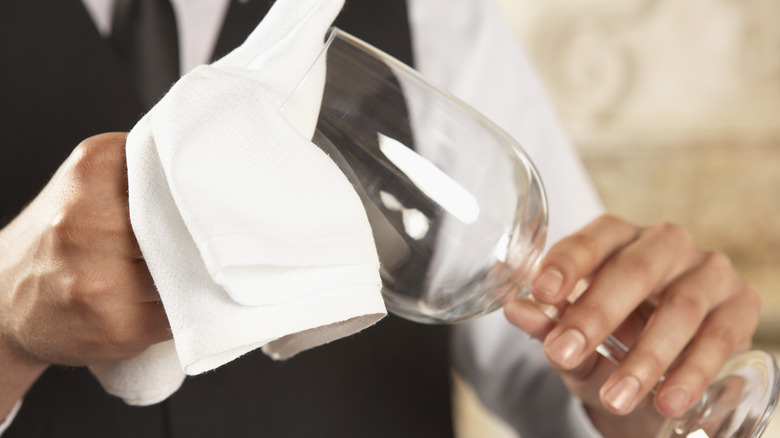Why Polishing Is The Extra Step Your Wine Decanter Needs
Decanting is the ideal way to get the best flavor out of your wine — and, to clarify, we mean decanting wine with a decanter, and not hyper-decanting in a blender, which you really should avoid. On top of decanters allowing wine to aerate and unlocking all the subtle notes within, these glass vessels are often a work of art unto themselves. Foodie spoke with Maximilian Riedel, CEO and President of the Riedel glassware company, about polishing your decanters to keep them as beautiful (and useful!) as the day you bought them.
Whether you are serving up a rare vintage at a five-course dinner or simply choosing an everyday wine to pair with your pizza, you deserve to enjoy wine in peak form. It's not enough to decant wine, however; you also need to keep your decanter clean. To that end, you shouldn't skip polishing your glassware, says Riedel. "[O]wning a proper polishing cloth and regularly polishing your glassware is essential to the upkeep," he explains. This isn't simply about ensuring your decanter is pretty enough to keep on display — polishing actually improves the lifespan of your decanter.
Don't skip polishing as part of maintenance
In terms of sensory pleasures, many wine drinkers prefer the sweetest vino and the clearest glass. To achieve the latter, of course you need to polish your decanter the same way your polish your wine glasses. But polishing is more than an extra step to make glassware shine. It actually prolongs the usefulness of your decanter. After washing, practically invisible residue from the soap or water you used can cling to the glass, potentially affecting the taste of your wine. Polishing helps to remove these artifacts. It also prevents water spots (which can eventually dull the glass) and can buff out superficial scratches.
Riedel recommends his company's microfiber polishing cloths to "ensure your glassware sustains its quality over time, while also making your glassware shine its best after proper cleaning." Polishing works most effectively after (carefully!) steaming your decanter over a bucket of boiling water or the mouth of a tea kettle. If you don't have the Riedel cloth, any microfiber towel should do the trick. Avoid any scratchy or linty surfaces like paper towels or terrycloth, and use a gentle hand.

